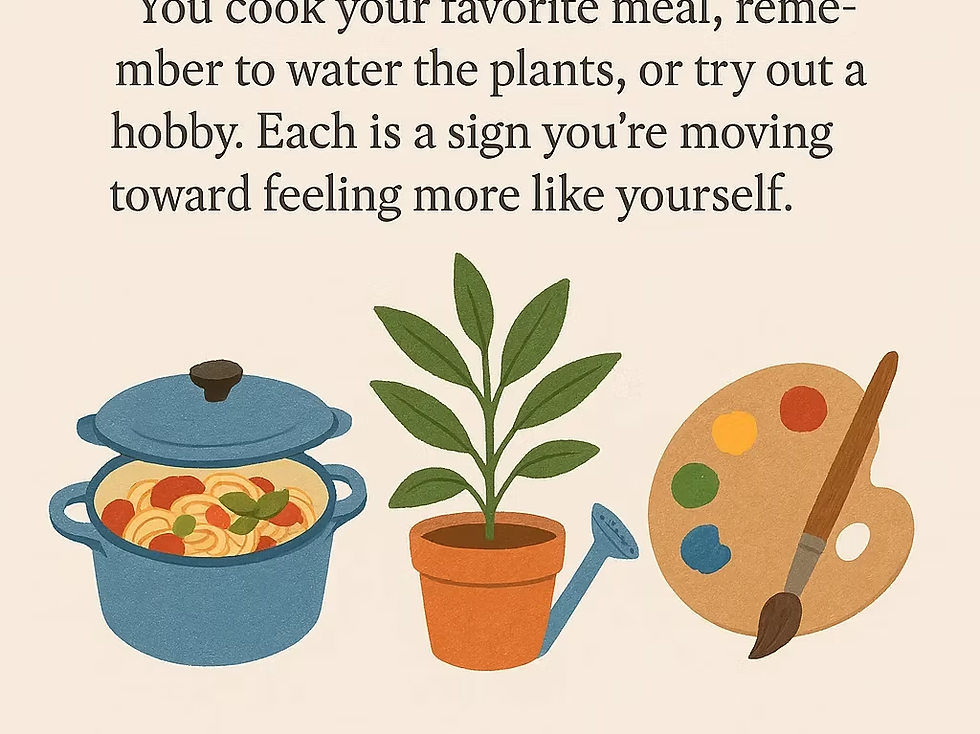Life After Trauma
- C. L. Nichols

- Oct 4, 2025
- 3 min read
Thrive After Loss, Hurt, or Change.
Going through trauma changes how you see the world and yourself.
After the healing, forgiveness, and finding a new sense of self, you wonder what comes next.
How do you rebuild your life? How do you protect yourself while moving forward? How do you find joy and trust again?
This article offers advice to keep growing after trauma. Set boundaries, rebuild confidence, create relationships, discover purpose, and practice self-care.
An important step is to set boundaries. Trauma leaves you feeling vulnerable and drained. Protect your emotional space to keep safe while you heal.
Know what you can handle emotionally, physically, and mentally. Say no when something crosses your limit.
Topics come up in conversations that upset. People can trigger old pain. Avoid those situations. Let others know you don’t want to talk about certain things.
It feels uncomfortable at first, especially if you’re used to saying yes to keep peace.
Protecting your well-being is not selfish, it’s necessary.
Say “I’m not ready to discuss this right now” or “I need to take a step back from this relationship for a while.” If people push back, stay firm. Give yourself room to heal.
Trauma dents your self-confidence. You question your worth and abilities. Rebuilding is a gradual process that comes from small actions and changes to how you talk to yourself.
Get up on time, go to work, try something new. Celebrate these small victories. They show that you’re capable, even when things feel hard.
Catch negative thoughts when they come. Replace them with kinder ones. Instead of “I can’t do this,” try, “I’m doing my best, and that’s enough.” Self-talk helps you feel stronger over time.
Apply for jobs even when you feel scared. Sign up for a class you’ve wanted to try. Reach out to an old friend even if it’s awkward. These rebuild your sense of value and belief in a future not defined by pain.
After trauma, trusting others or new relationships feels scary. You worry about being hurt again or doubt if anyone understands you. Building relationships again takes patience, but it’s vital for healing.
Start at your own pace. Don’t share everything at once or trust people too quickly. Being around kind, patient people makes a difference.
Look for groups where people share similar experiences, like support groups or hobby clubs. Volunteering is a great way to meet others while feeling helpful.
Help out at a community garden or animal shelter to build friendships from common purpose. These bring gentle support without heavy pressure.
Trauma changed your sense of who you are and the meaning you find in life. After healing, many search for a renewed purpose that fits who they are now.
Meaning can come from everyday choices. Help a neighbor, care for a pet, or start a creative project.
New goals give a sense of direction. Learn to cook a new recipe, finish a book, or take walks in nature.
These activities add up. They show that life has things to offer again. You have the power to shape your days.
Taking care of yourself is important. Self-care isn’t indulgence. It’s keeping yourself healthy.
Make regular sleep a priority. Eat nourishing food that fuels your body. Walk, stretch or do activities that feel good without pressure.
Get professional help if things become overwhelming. Counselors specialize in helping people manage recovery. They offer support tailored to your situation.
Progress is the little things. Eat breakfast, wash clothes, make plans for the day.
Healing is messy, and setbacks happen. Choose to keep going. Make a life worth living, one day at a time.








Comments